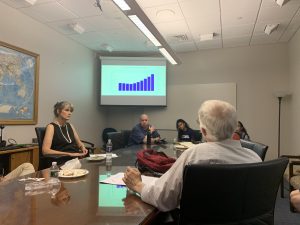Contributed by Samuel Martínez

Arthur (Leigh) Binford, UConn Anthropology PhD, and former professor at UConn-Hartford, University of Puebla (Mexico) and CUNY Staten Island, made the first “tertulia” luncheon seminar presentation of the 2019-20 academic year on Wednesday, 25 September 12:00-1:30PM, at El Instituto’s Ryan Building conference room. Dr Binford’s talk compared temporary migrant worker programs in Canada and the United States. This comparison, for him, illustrates the fundamentally “unfree” character of temporary migrant labor programs. H2A temporary work permits in the United States provide minimal legal and wage protections but also place migrants in situations of complete dependence on labor contractors and employers. The Canadian Seasonal Agricultural Worker Program (SAWP) recruits migrants, by contrast, through government agencies in the migrants’ home countries, but consular officials are discouraged to take actions to protect their country’s migrants when employers freely switch labor sources from one country to another in a “race to the bottom” search for the most compliant workers. Above all, migrant rights are harmed when their legal authorization to work depends upon their satisfying the demands of one employer and lapses after the completion of the job. The surest sign of their un-freedom, Binford reports, are the debilitating and dangerous levels of worker productivity — which far exceed the productivity levels of native workers — imposed on a captive migrant labor force by farmers, tree planters, wholesale nursery operators and other employers. Pointing out that both the H2A and SAWP have expanded in recent years, Binford lastly pointed out to the students and faculty in attendance the need for more workplace-situated and commodity-specific research on temporary migrant worker programs.